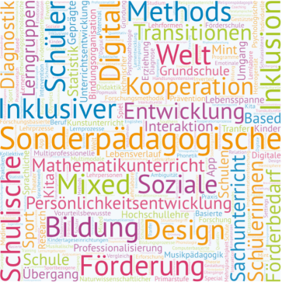Forschung

Die Forschung auf dem Gebiet der sonderpädagogischen Förderung und Inklusion ist facettenreich und umfasst ein breites Spektrum. Von der Grundlagenforschung bis zur spezifischen anwendungsorientierten Forschung gehen die Forschenden Fragen in den Förderschwerpunkten Emotionale und soziale Entwicklung, Lernen und Sprache sowie in den Fachdisziplinen Bildungswissenschaften, Deutsch, Englisch, Kunst, Mathematik, Musik, Psychologie, katholische und evangelische Religion, Sachunterricht und Sport nach. Zudem befassen sich die Forschenden gemeinsam in der Arbeitsgruppe Vernetzung in der Forschung und Forschungsstrategie mit übergeordneten Fragestellungen.
